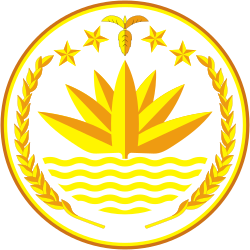18 February 1979 | ||||||||||||||||||||||||||||
300 of the 330 seats in the Jatiya Sangsad 151 seats needed for a majority | ||||||||||||||||||||||||||||
|---|---|---|---|---|---|---|---|---|---|---|---|---|---|---|---|---|---|---|---|---|---|---|---|---|---|---|---|---|
| Registered | 38,363,858 | |||||||||||||||||||||||||||
| Turnout | 51.29% ( | |||||||||||||||||||||||||||
| ||||||||||||||||||||||||||||
| ||||||||||||||||||||||||||||
 |
|---|
General elections were held in Bangladesh on 18 February 1979. The result was a victory for the Bangladesh Nationalist Party (BNP), the party of the incumbent military regime, which won 207 of the 300 directly elected seats, although it only won 41% of the vote. [1] [2] Voter turnout was 51%. [3] [4] The Awami League became the main opposition party after winning 39 seats. [5]
The elections were organized by the military regime in Bangladesh. [6] The elections were postponed twice, as they were initially supposed to be held in December 1978. [6] The political opposition in Bangladesh intended to boycott the elections unless the military regime withdrew martial law, assured that there would be a parliamentary system, released political prisoners, and restored full press freedom. [6] Ziaur Rahman made some concessions to the opposition, but they fell short of their full demands. [6] Subsequently, some opposition parties decided to take part in the elections. [7]








